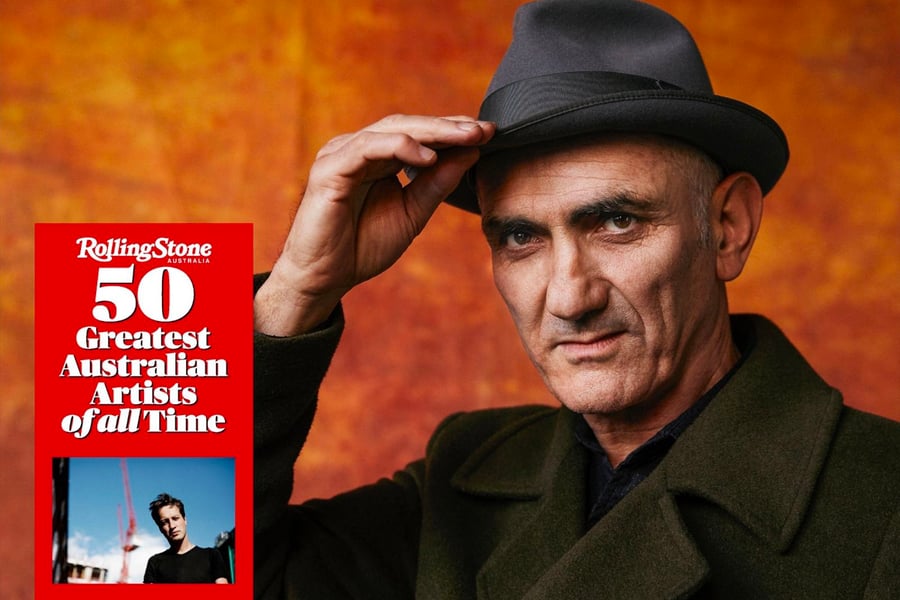In December of 2020, Rolling Stone Australia released a special edition issue which looks at the 50 Greatest Australian Artists of All Time, paying tribute to the best and most impactful artists in Australian music history. While it would have been easy for the editors and writers of the publication to profess their love of the listed artists, the decision was instead made for those who found themselves inspired by these world-renowned names to share their own testimonials of why these artists deserve to make the list.
In celebration of the issue’s release in December, we’re counting down the full 50 artists and their accompanying testimonials in this ongoing online feature. If you want to get your hands on an physical copy of the magazine, be sure to subscribe now to experience the double-length edition featuring some of Australia’s best and brightest discussing the finest names in local music.
50 Greatest Australian Artists of All Time – #10: Paul Kelly (by Marlon Williams)
I must’ve been ten the first time I heard a Paul Kelly song. We had a new Macintosh computer and my dad would borrow magazines from the library and rip the accompanying compilation CDs into iTunes (sorry Paul, sorry Rolling Stone).
The only problem was that dad never logged who the artist was, so there I was one day scrolling through the anonymous tracks when “My Winter Coat” came on. It had me completely: The streets the lovers walked down were the streets of my hometown; the market they played in was surely the one at the Christchurch Arts Centre. And at that age, I had seen just enough of the world to know the lover’s act of practical charity to shield the other from the cold with a well-fitting coat was more than just a prosaic detail. There was something luminous about everyday life.
A long time passed by before I ever actually registered the name Paul Kelly. My early teens saw me digging deeply into the cultural mythos of the American South, first through the likes of Dylan and The Band and then further back to Hank Williams and the Stanley Brothers. Then one day I stumbled across an album in the bluegrass section of the library: Paul Kelly with Uncle Bill – Smoke.
I was dubious, but having exhausted all the authentic, American bluegrass I thought I may as well give this outfit from Australia a crack. And there it was. That voice from the winter markets; piercing, strong and sure, and at the same time fragile and searching. This time it was a murder ballad sung in searing three part harmony, “I Don’t Remember a Thing”. Here he was expertly wielding musical and literal forms I naively thought sacred and specific to a place far away from Australia and New Zealand. It made me think it might be possible for a boy from Lyttelton to tell those kinds of stories, in that way, too.
“It made me think it might be possible for a boy from Lyttelton to tell those kinds of stories.”
Love Music?
Get your daily dose of everything happening in Australian/New Zealand music and globally.
To this day, Paul remains humbled by the task of songwriting, and awed by others successes. I think it’s this humility that allows so many Australians of all walks of life to trust him and celebrate him. To trust him with their stories; their sense of shared identity, loosely construed. Hannah Arendt said that good storytelling “reveals meaning without committing the error of defining it” – and that’s what Paul does. Nothing is axiomatic. Human joy and suffering are contingent states and, no matter how dark the dark or bright the bright, something might come along any minute and flip the script entirely.
A few months ago I was sitting backstage at a gig in Melbourne, and there was Paul, reading a book in the corner, as he’s often known to be doing. Anyone who’s been me in that situation knows the deafening silence. After a long while of nothing he peered over the top of his glasses at me. “Marlon, what’s your favourite key change in a song?” I furiously scanned my brain for the most interesting answer. “Probably the one in ‘And I Love Her’…”. He paused and thought for a moment. “The semitone up for George’s solo. Yeah, that is a good one,” and went back to his reading.



































